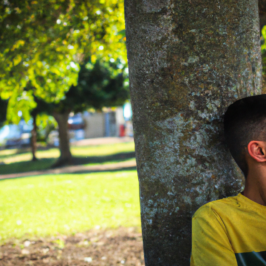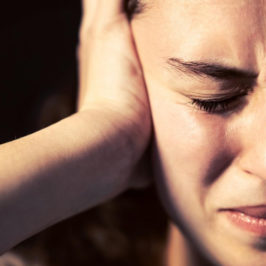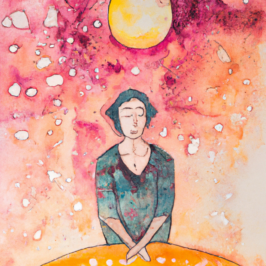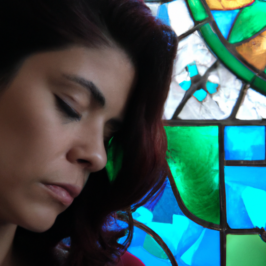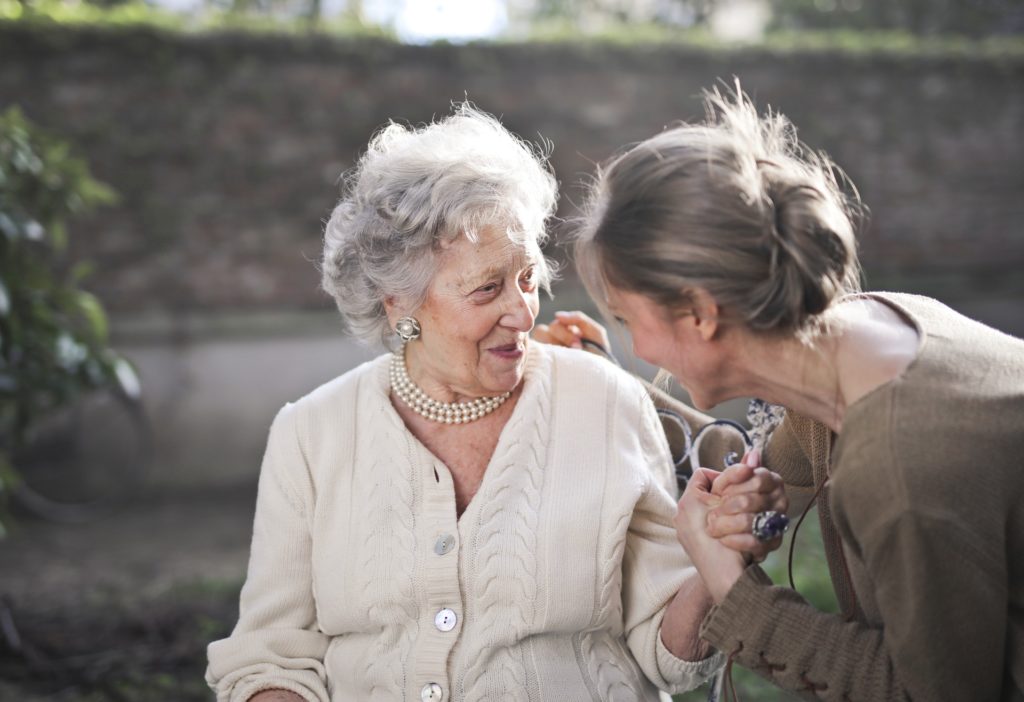
By: Trisha Chason, LGPC
Trisha Chason, LGPC, works with the widest age-range of any clinician on our team, treating clients as young as 16 and into their 60s. She has a particular interest in helping people through major life transitions, including as they move into mid-life. Because of this experience, we thought she’d be the perfect person to go to with some questions we had about the mental health impact that comes with getting older.
I feel like sometimes when we talk about mental health, we have this idea that it’s just something you’re either dealing with or not. But really, a lot of the time older adults are dealing with things younger people aren’t. Do you think their attitudes around mental health are different, too?
Oh, for sure! But I don’t think it has to do with age, I think it has to do with the different cultures that people come up in. Kids today will say, “I have anxiety” or “I have depression.” They have these thoughts of themselves as beings with an emotional component that could even be addressed. A lot of people in my father’s generation either lived through the Depression or lived in a household that had lived through the Depression, and emotions were less talked about then. Their experience is “Whatever you’ve got to deal with, you’ve got to deal with. That’s your problem, that’s nobody else’s problem.” Now we’ve found out, “Oh, kids have feelings, too.” When they’re older, kids today will probably be more likely to seek out assistance and deal with things than Baby Boomers or generations before. So just as the culture changes, people have different viewpoints of that.
And just like the Great Depression, we saw some of those same traumas like losing your job or your home in 2009. But does care look different when someone’s anxieties or traumas go back 60, 70, 80 years?
It’s different in the way that we’re all different. My life experience is not exactly like yours, so things are going to trigger me that aren’t going to trigger you and vice versa. So we have to work with that person wherever they are, but the types of tools that I’m going to give them are going to be very similar across clients.
What are some things that might be specifically impacting someone because of age?
Well, when we go through different life stages, we have different goals. When you’re three you’re learning to deal with materials. When you’re ten you’re learning to take some lessons from your family into the outside world and see how they work. And then at middle-age and later, you’re looking back and saying “Did I do some good stuff? Do I need to do some good stuff? How do I feel about that stuff I did? How do I feel about what I want to do?” You start realizing that you’re not going to live forever. Some people have big feelings about that, and some people just ignore it and go on their merry way, and either one of those reactions could be okay.
Sounds kind of scary to me. I think I’m definitely in the first camp.
A lot of times, it’s hard to get older. And sometimes in mid-life and older, it becomes a little bit more challenging to maintain friendships. When you’re a kid you have this automatic friendship generating machine called school, and when you’re in college that becomes intensified because you’re living with your friends. But then once you get into middle age, sometimes it’s harder to make new friends because you don’t have those little friendship-making petri dishes like school or college or a new job. Having a strong sense of community is one of the key quality-of-life factors as we age. That can be your place of worship, it can be your neighborhood, your sorority from college, it can be any number of things, but having that strong sense of where you fit in is really one of the most important things when you look at people who have long healthy lives. They always have community, a sense of purpose, and some sort of regular physical activity.
And work is such a big part of that too, I’m guessing. We spend so much time at work, and most of the time it doesn’t taper off, it just ends all at once when we retire. I feel like there must be a lot of complicated feelings around that, especially as a form of community.
A lot of times there’s grief experience just at the loss of capacities. If your work had to do with your strength and stability and then those things are fading away as you age, there’s a sense of grief or losing myself. Like “What am I now?” For people who retire, there’s really a broad variety of experiences after retirement. Some people don’t ever want to retire because that’s how they define themselves. So continuing to work or putting a lot of focus into what’s going to happen to you in retirement (what you want your life to look like, what you want your new purpose to be) can improve quality of life and longevity tremendously. People who just retire and go home and sit on the sofa just don’t last that long. What we do know is that when we do nothing, it tells our body that we’re done. If we retire and say, “I’m going to practice and run a 5K,” we can do that too. They know now that you can build muscle and memory even into your nineties [It’s true! You might not suddenly become a twenty-something, but research consistently shows that mental and physical fitness can still be improved far into older adulthood!]. That was also another shift, I think, because people my parents’ age (late seventies/early eighties) didn’t have the concept necessarily that they could do something new when they retire. Those things really shift our ability to have a quality of mental health and a quality of living in terms of the physicality of our life.
If people wanted to talk to their parents/grandparents/the random old people in their lives who just don’t seem like themselves anymore and say, “Hey, it might really help to talk to a therapist” without seeming condescending, how do you think they should go about that?
You can just say it right out and they might say, “Hell no.” But I wouldn’t beat around the bush. I would say, “It seems like maybe you’re suffering more than you need to. What might you be willing to do about that? Do you think talking to your primary care provider would be something you’d be willing to do? Or do you think that talking to a mental health therapist would be something that you’re willing to do? Or do you think that involving yourself in some sort of social interaction would be helpful?” It could be something at the senior center or something at the Y – just some way for them to have some additional connection so that even if they’re really saying a hard “No” to the whole therapy thing (which sometimes elderly people do) there are still options and you’re still having an open conversation that’s letting them participate in making a choice about feeling better.
What do you think are some of the most important things older adults can do to promote their own mental health?
I think the most important things they can do are take good care of their bodies – sleep well, find some kind of movement that you love (it doesn’t need to be running a marathon, it can be waltzing), find some kind of community that feels supportive and make sure that you have something you feel like you want to get up and do every morning.
What about younger people who want to stay mentally healthy as they get older? Same things? Different things?
I always say the same things. Be mindful of what you’re doing and how that matches the story you want to have for yourself.
Is goal setting something you work on with your clients during therapy?
Absolutely. And some people don’t have a sense of what they want to do with themselves. A lot of people live their whole lives fairly undirected. Someone offers them a job and they take that job and they work in that job for thirty years without a lot of thought behind it. And then sometimes people are very intentional, and if something doesn’t go the way they intended, that can become a crisis. So there’s all different areas of stress and strain as we navigate the different stages. Like getting to mid-life and saying, “Okay, what did I really do with those years? Was that okay?” And if it’s not and it’s too late, “What do I do about that? Do I want to reinvent myself? Am I uncomfortable in this place where I’ve landed? Do I want to take flight or give myself a nice nest in the corner of the yard?” A lot is about what you want. What do you think might be good? What do you want to experiment with? What have you liked before? What has worked for you before? What has felt pleasant?
So is that a firm endorsement for people being able to keep growing and changing?
Absolutely! I say it’s never too late to do something fun/crazy/courageous. Write your life’s work, climb Kilimanjaro, whatever it is. It’s okay to shift gears. I am a firm believer in that.
*Interview has been edited for clarity and length.
DISCLAIMER
The information, including but not limited to, text, graphics, images and other material contained on this website are for informational purposes only. No material on this site is intended to be a substitute for professional medical advice, diagnosis, or treatment. Always seek the advice of your physician or other qualified healthcare provider with any questions you may have regarding a medical condition or treatment and before undertaking a new health care regimen, and never disregard professional medical advice or delay in seeking it because of something you have read on this website.

